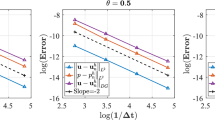Abstract
In this work we describe a fast solution algorithm for the time dependent Navier–Stokes equations in the regime of moderate Reynolds numbers. Special to this approach is the underlying discretization: both for spatial and temporal discretization we apply higher order Galerkin methods. In space, standard Taylor-Hood like elements on quadrilateral or hexahedral meshes are used. For time discretization, we employ discontinuous Galerkin methods. This combination of Galerkin discretizations in space and time allows for a consistent variational space-time formulation of the Navier Stokes equations. This brings along the benefit of a well defined adjoint problem to be used for optimization methods based on the Euler-Lagrange approach and for adjoint error estimation methods. Special care is given to the solution of the algebraic systems. Higher order discontinuous Galerkin formulations in time ask for a coupled treatment of multiple solution states. By an approximative factorization of the system matrices we can reduce the complex system to a multi-step method employing only standard backward Euler like time steps.
Access this chapter
Tax calculation will be finalised at checkout
Purchases are for personal use only
Preview
Unable to display preview. Download preview PDF.
Similar content being viewed by others
References
R. Becker, M. Braack, A finite element pressure gradient stabilization for the Stokes Equations based on local projections, Calcolo Vol. 38, No. 4, pp 173-199 (2001)
R. Becker, M. Braack, Multigrid techniques for finite elements on locally refined meshes, Numerical linear Algebra with Applications, Vol. 7, pp 363-379 (2000)
R. Becker, R. Rannacher, An Optimal Control Approach to A Posteriori Error Estimation in Finite Element Methods, Acta Numerica 2001, Cambridge University Press, Vol. 37, pp 1-225, (2001)
M. Braack, E. Burman, V. John, G. Lube, Stabilized finite element methods for the generalized Oseen problem, Comput. Methods Appl. Mech. Engrg. Vol. 196, 853-866 (2007)
C. Brezinski, U. Ieea, J. V. Iseghem, A Taste of Pade Approximation, Acta Numerica 4:53-103, Cambridge University Press (1995)
V. Girault, P.-A. Raviart, Finite Element Methods for the Navier–Stokes Equations, Springer: Berlin-Heidelberg-New York, (1986)
J.G. Heywood, R. Rannacher, S. Turek, Artificial boundaries and flux and pressure conditions for the incompressible Navier-Stokes equations, Int. J. Numer. Math. Fluids (22), pp 325-352 (1992)
C. Johnson, Error estimates and adaptive time-step control for a class of one-step methods for stiff ordinary differential equations, SIAM J. Numer. Anal., 25(4), pp. 908–926, (1988)
D. Meidner, B. Vexler, Adaptive Space-Time Finite Element Methods for Parabolic Optimization Problems, SIAM J. on Control Optimization 46(1), pp 116–142 (2007)
T. Richter, A. Springer, B. Vexler, Efficient numerical realization of discontinuous Galerkin methods for temporal discretization of parabolic problems, accepted for Numerische Mathematik, 2012
M. Schäfer, S. Turek, Benchmark computations of laminar flow around a cylinder. (With support by F. Durst, E. Krause and R. Rannacher), Flow Simulation with High-Performance Computers II. DFG priority research program results 1993-1995, pp 547-566, Vieweg, Wiesbaden (1996)
M. Schmich, Adaptive Finite Element Methods for Nonstationary Incompressible Flow Problems, Dissertation, Universität Heidelberg (2009)
M. Schmich, B. Vexler, Adaptivity with dynamic meshes for space-time finite element discretizations of parabolic equations, SIAM J. Sci. Comput., Vol. 30, No. 1, pp. 369-393.
M. Schmich, B. Vexler, Adaptivity with dynamic meshes for space-time finite element discretizations of parabolic equations, SIAM J. Sci. Comput., Vol. 30, No. 1, pp. 369-393, (2008)
S. Turek, Efficient Solvers for Incompressible Flow Problems, Lecture Notes in Computational Science and Engineering 6, Springer, (1999)
The Finite Element Toolkit Gascoigne, http://www.gascoigne.uni-hd.de.
Author information
Authors and Affiliations
Corresponding author
Editor information
Editors and Affiliations
Rights and permissions
Copyright information
© 2012 Springer-Verlag Berlin Heidelberg
About this paper
Cite this paper
Richter, T. (2012). Discontinuous Galerkin as Time-Stepping Scheme for the Navier–Stokes Equations. In: Bock, H., Hoang, X., Rannacher, R., Schlöder, J. (eds) Modeling, Simulation and Optimization of Complex Processes. Springer, Berlin, Heidelberg. https://doi.org/10.1007/978-3-642-25707-0_22
Download citation
DOI: https://doi.org/10.1007/978-3-642-25707-0_22
Published:
Publisher Name: Springer, Berlin, Heidelberg
Print ISBN: 978-3-642-25706-3
Online ISBN: 978-3-642-25707-0
eBook Packages: Mathematics and StatisticsMathematics and Statistics (R0)




